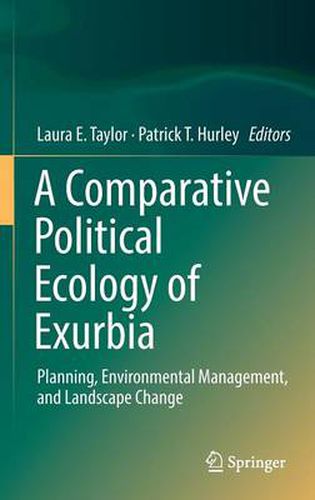Readings Newsletter
Become a Readings Member to make your shopping experience even easier.
Sign in or sign up for free!
You’re not far away from qualifying for FREE standard shipping within Australia
You’ve qualified for FREE standard shipping within Australia
The cart is loading…






This title is printed to order. This book may have been self-published. If so, we cannot guarantee the quality of the content. In the main most books will have gone through the editing process however some may not. We therefore suggest that you be aware of this before ordering this book. If in doubt check either the author or publisher’s details as we are unable to accept any returns unless they are faulty. Please contact us if you have any questions.
This book is about politics and planning outside of cities, where urban political economy and planning theories do not account for the resilience of places that are no longer rural and where local communities work hard to keep from ever becoming urban. By examining exurbia as a type of place that is no longer simply rural or only tied to the economies of global resources (e.g., mining, forestry, and agriculture), we explore how changing landscapes are planned and designed not to be urban, that is, to look, function, and feel different from cities and suburbs in spite of new home development and real estate speculation. The book’s authors contend that exurbia is defined by the persistence of rural economies, the conservation of rural character, and protection of natural ecological systems, all of which are critical components of the contentious local politics that seek to limit growth. Comparative political ecology is used as an organizing concept throughout the book to describe the nature of exurban areas in the U.S. and Australia, although exurbs are common to many countries. The essays each describe distinctive case studies, with each chapter using the key concepts of competing rural capitalisms and uneven environmental management to describe the politics of exurban change. This systematic analysis makes the processes of exurban change easier to see and understand. Based on these case studies, seven characteristics of exurban places are identified: rural character, access, local economic change, ideologies of nature, changes in land management, coalition-building, and land-use planning. This book will be of interest to those who study planning, conservation, and land development issues, especially in areas of high natural amenity or environmental value. There is no political ecology book quite like this-neither one solely focused on cases from the developed world (in this case the United States and Australia), nor one that specifically harnesses different case studies from multiple areas to develop a central organizing perspective of landscape change.
$9.00 standard shipping within Australia
FREE standard shipping within Australia for orders over $100.00
Express & International shipping calculated at checkout
This title is printed to order. This book may have been self-published. If so, we cannot guarantee the quality of the content. In the main most books will have gone through the editing process however some may not. We therefore suggest that you be aware of this before ordering this book. If in doubt check either the author or publisher’s details as we are unable to accept any returns unless they are faulty. Please contact us if you have any questions.
This book is about politics and planning outside of cities, where urban political economy and planning theories do not account for the resilience of places that are no longer rural and where local communities work hard to keep from ever becoming urban. By examining exurbia as a type of place that is no longer simply rural or only tied to the economies of global resources (e.g., mining, forestry, and agriculture), we explore how changing landscapes are planned and designed not to be urban, that is, to look, function, and feel different from cities and suburbs in spite of new home development and real estate speculation. The book’s authors contend that exurbia is defined by the persistence of rural economies, the conservation of rural character, and protection of natural ecological systems, all of which are critical components of the contentious local politics that seek to limit growth. Comparative political ecology is used as an organizing concept throughout the book to describe the nature of exurban areas in the U.S. and Australia, although exurbs are common to many countries. The essays each describe distinctive case studies, with each chapter using the key concepts of competing rural capitalisms and uneven environmental management to describe the politics of exurban change. This systematic analysis makes the processes of exurban change easier to see and understand. Based on these case studies, seven characteristics of exurban places are identified: rural character, access, local economic change, ideologies of nature, changes in land management, coalition-building, and land-use planning. This book will be of interest to those who study planning, conservation, and land development issues, especially in areas of high natural amenity or environmental value. There is no political ecology book quite like this-neither one solely focused on cases from the developed world (in this case the United States and Australia), nor one that specifically harnesses different case studies from multiple areas to develop a central organizing perspective of landscape change.